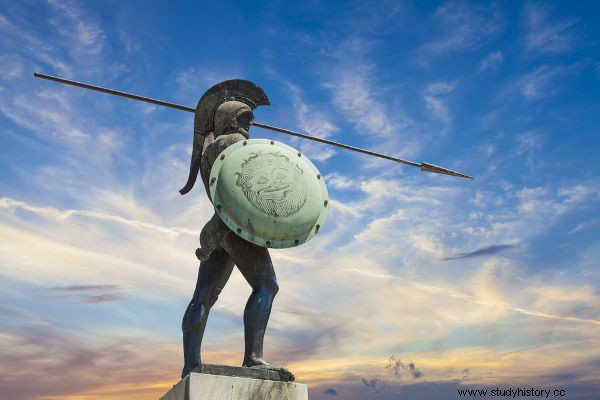
By Rainer Sousa
Strength, obedience and agility. These are some of the few words used when we think about the values that were commonly disseminated among the Spartans in Ancient Greece. The defense of its own city-state and the pride of launching itself into combat turned Sparta into an unparalleled military training center that was not close to that of any other society inhabiting Hellas. For this, the Spartan was trained from birth.
Shortly after birth, the child was checked by an elder, who decided whether the newborn was physically fit enough to defend his people. Years later, between the ages of seven and eighteen, young people were subjected to a rigid training routine that improved the future soldier's ability to fight. After that, a member of the Spartan army devoted the rest of his life to combat. Only when he reached sixty years of age could he finally rest.
By noticing this taste for fighting, the feeling of superiority and concern for physical condition, we concluded that the Spartans were courageous and intrepid men. Probably many people would hardly have thought that homosexual practice would be common in the ranks of this powerful military force. Director Zack Snyder's own film "300" reinforces this same impression by repeatedly extolling King Leonidas' passion for his beloved queen.
However, some studies suggest that homosexual behavior was common among those who participated in routine battles. According to such research, military commanders believed that closer ties between two warriors could make them more willing to fight for the city-state. In addition, the very involvement served as a strategy by impelling the soldier to continue in battle for his companion.
We can see that among the Spartans the question of homosexuality revolved around implications far removed from ours. Instead of resulting in an idea of fragile or feminine behavior, homosexuality gained another treatment. At this point, we have to take into account that Spartan women were vigorous and, consequently, would also be far from the more conservative stereotypes of contemporary women.
One of the most striking examples of this trait of Spartan culture can be seen in the figure of General Pausanias. As the successor to King Leonidas, this well-known military leader defended homosexual practice as a superior form of love expression. However, he made a point of severely criticizing this same custom among men who were of the same age group.
Man's gaze on the past is always impregnated with some interest or value elaborated in the present. In the theme explained here, we perceive the real meaning of this sentence when observing the Spartan culture better. Undoubtedly, the new information that arrives from the past has the impressive ability to change many of the impressions we took before as a natural datum of what we already knew.
